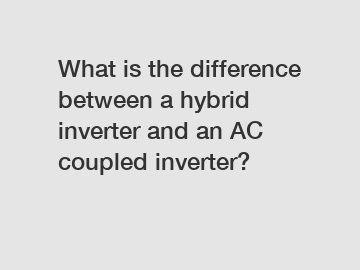What is the difference between a hybrid inverter and an AC coupled inverter?
What is the difference between a hybrid inverter and an AC coupled inverter?
Hybrid and AC coupled inverters are two types of inverters commonly used in renewable energy systems, but they have distinct differences in their functionality and applications.
A hybrid inverter, also known as a multi-mode inverter, is an advanced device that can work in both grid-tied and off-grid modes. It is capable of integrating renewable energy sources like solar panels and wind turbines with energy storage systems such as batteries. In grid-tied mode, a hybrid inverter can convert the DC power generated by the solar panels or wind turbines into AC power, which can be used to power electrical devices or exported to the grid. In off-grid mode, it can draw power from the batteries to supply electricity when there is no grid connection.

In contrast, an AC coupled inverter is primarily used in grid-tied systems and does not have the off-grid capability of a hybrid inverter. It is designed to work with an existing grid-tied solar power system and an additional battery storage system. The AC coupled inverter connects to the grid-tied inverter and the battery system, allowing excess solar energy to be stored in the batteries instead of being exported to the grid. This stored energy can then be used during times of high electricity demand or when there is a power outage.
The key difference between these two types of inverters lies in their ability to provide power during grid outages. A hybrid inverter can operate independently from the grid, making it suitable for areas with unreliable electricity supply or for those who prefer to be self-reliant. On the other hand, an AC coupled inverter relies on the existing grid-tied system and cannot provide power during a blackout unless it is coupled with an external backup generator or a separate off-grid inverter.
The selection of the appropriate inverter depends on the specific requirements of the system and the user's preferences. Hybrid inverters offer more flexibility and independence, but they tend to be more expensive and complex to install compared to AC coupled inverters. AC coupled inverters, on the other hand, are more straightforward to integrate into existing grid-tied systems and can be a cost-effective solution for homeowners who primarily want to optimize their solar energy usage and reduce their reliance on the grid.
In conclusion, while both hybrid and AC coupled inverters serve the purpose of integrating renewable energy sources with battery storage systems, the key difference lies in their ability to operate independently from the grid. The choice between these two types of inverters depends on the user's specific needs, level of grid reliability, and budget considerations. Understanding the differences and advantages of each type can help individuals make an informed decision when designing their renewable energy systems.
For more information, please visit Commercial hybrid storage inverter, scalable grid connected inverter, lithium storage battery for Renewable energy storage solutions .

Comments
0